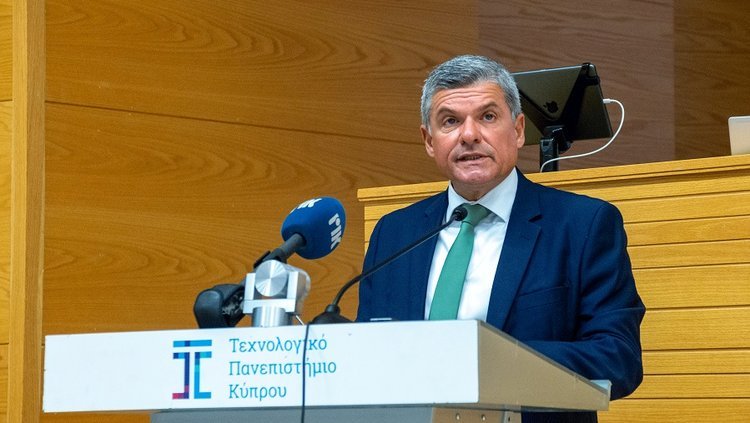Papanastasiou: Decision on electrical interconnection "in coming weeks"
08:14 - 28 August 2024

Cyprus is at a critical juncture, where decisions must be made in the coming weeks regarding its electrical interconnection with mainland Europe and neighbouring countries, Energy Minister George Papanastasiou said addressing a conference.
Musing how the current cost of electricity production in Cyprus is "a killer for households, industry, and the economy", the minister went on to highlight the importance of interconnection and expanding the use of solar energy through photovoltaic systems.
Speaking at the opening of the EuroSun2024 scientific conference in Limassol, Papanastasiou detailed the ministry's three key strategies for reducing electricity costs. He said that the first pillar was the introduction of natural gas, which, although not the cleanest fuel, will reduce emissions by 40 to 45%. The second focuses on renewable energy sources, particularly solar power, with a push for energy autonomy in households and industries through incentives for photovoltaic installations and battery storage.
Minister Papanastasiou emphasised that combining conventional, costly electricity generation with affordable solar power requires a competitive market. The goal, as he said, was to achieve this by July 2025 through the opening of the electricity market.
The third pillar, according to the Minister, was the electrical interconnection of Cyprus with mainland Europe, which Papanastasiou stressed must be decided upon soon. He added that Cyprus remains the last EU member state not connected to the European electricity grid, but with financial support from the European Commission covering 30% of the €1.9 billion project, this interconnection was a priority.
Papanastasiou underscored the urgent need for Cyprus to join the common European electricity market, where the average retail electricity price is around 15 cents per kWh, compared to Cyprus' 33 cents per kWh. This high cost, he said, is a "killer" for the economy, industry, and households. Additionally, he pointed out the importance of securing energy supply in a region plagued by conflicts and instability.
The minister also addressed the broader energy transition goals, including the ambitious targets set by Cyprus in its revised National Energy and Climate Plan for 2030, which aims for significant contributions from renewable energy sources in electricity, heating, cooling, and transportation sectors. Despite challenges, Papanastasiou highlighted that in 2022, Cyprus saw the third-largest increase in renewable energy use in heating and cooling among EU member states, largely driven by solar energy.
Papanastasiou concluded by stressing the importance of high ambitions, saying that Cyprus aims for a future where 100% of its electricity comes from renewable sources, despite the current challenges in achieving these targets. The upcoming second MED9 Energy Ministerial Meeting in Larnaca, he said, would further discuss the strategic goal of transforming the Mediterranean region into a green energy corridor between the EU and non-EU countries.

